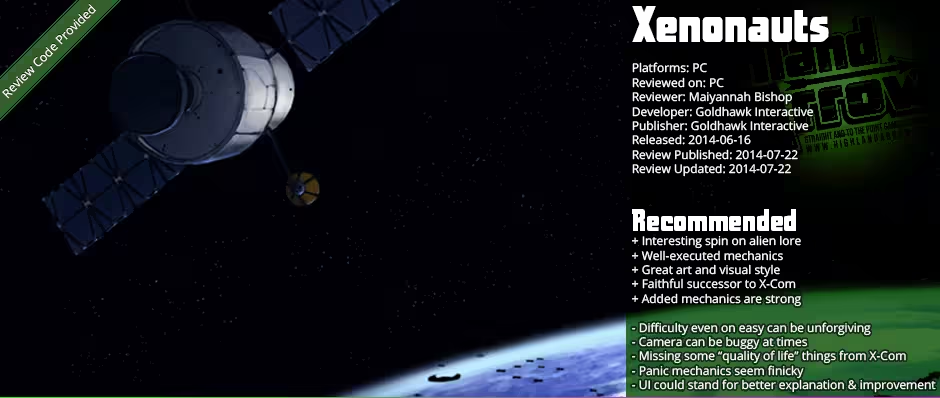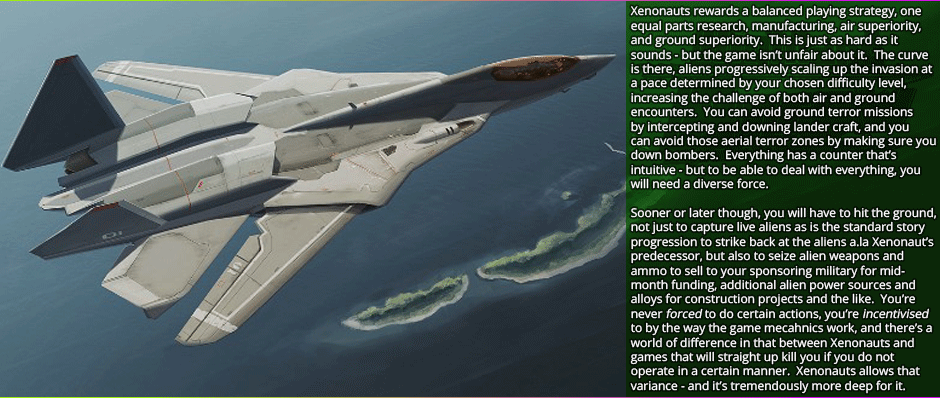

Editor's Note: This review was written using a review code provided free of charge by Goldhawk Interactive.
Xenonauts is a dual mode strategy game developed and published by Goldhawk Interactive inspired by the classic X-Com series of old. The question that raises is obvious: how does it compare to the original, or to the rebooted game developed by Firaxis? (reviewed here) Well, I wouldn't say that comparisons to Firaxis' reboot are entirely fair, because X-Com: Enemy Unknown was focussed on very small squads of soldiers that would gain very action hero-y abilities as they progressed. Xenonauts is much more intelligent, frankly. It requires forethought, tactical skill, and the ability to keep a lot of balls in the air at the same time, so to speak. You can't rely on single action-hero type soldiers, but rather advance in a squad, use squad tactics, and react much more precisely to those changing battlefield conditions. Okay, so it's harder - but is it better?
That's a more complicated question, and the helpful comparisons are better made with the original game than to X-Com: Enemy Unknown, because Xenonauts is trying to be much more of a closer following to the classic than the latter.
Xenonauts is a faithful spiritual successor to X-Com: UFO Defense
I'll avoid going into depth on the mechanics at play here because X-Com was a game you could write a book on it seems, and Xenonauts is not different. I've spent a lot of time playing the original X-Com and no doubt many of you have as well, so I won't rehash the core mechanics. The important things to touch on are two-fold: first of all, if you were looking for a game that was faithful to the core mechanics of X-Com, you won't be disappointed, and secondly, those mechanics have been built onto and added to with logical progressions.
Most of the ways that these mechanics have been tweaked and added to are quality of life type things: for example, you can now air-strike a crash site rather than sending troops for a small monetary reward, so you no longer have to try to hit all the crash sites if your resources are tight. You can now select soldiers from a list and therefore cheery-pick some at least marginally-better soldiers when you're recruiting, rather than having completely random stats. The tradeoff seems to be that you don't get any really shining stars - or if you do, they're much rarer.
The new additions don't make Xenonauts any less difficult
If you're thinking to yourself that this sounds like it makes the game much easier, well, it does, in a way, but it's also made more difficult in other ways. The aliens will actually use strategies of their own for example: using aerial bombardment on cities rather than landing sometimes, for example, so you need to be up to speed in both ground and air superiority technology, you can't just focus on one. Secondly, the aliens will be much more aggressive about trying to interdict both your interceptors and your ground forces. The alien bases are not a one-off thing. And neither are assaults on the Xenonaut bases, if you're not defending them from larger UFO craft.

The AI presents a fair challenge that only gets more difficult on the higher difficulty levels. It's very good at using grenades to take out groups if you bunch up, flanking you if it has the positioning to, and ducking in and out of cover. It's a little tweaky about some things, but it's challenging all the same. The different behaviours that become evident across the various alien races you encounter also offer a subtle and wonderful way to differentiate them in more than visual ways. The aliens also have different roles: some are civvies, some are soldiers, some are commanders, and so forth.
Xenonauts isn't just X-Com with a new coat of paint
Along with the subtle differences - and those not so subtle - mentioned above, Xenonauts also has it's own aliens, with it's own lore for them. It's a very detailed seeming lore, and it's obvious that a great deal of thought was put into how these aliens would work both together and as individual units, how they developed, and how having access to this technology would evolve human weapon, armour, and vehicle designs. The artwork for aliens, humans, and the game in general is absolutely stunning in my opinion, masterly painted pieces of art in their own right.
The story that it extrapolates has similarity only with the broadest elements of that predecessor, and a lot of it's own direction and flavour. It paints it's own story of the alien invasion, and while finding it is mostly relegated to reading the dumps of exposition in the research reports, there's a definete tension to it, and a feeling that something deeper is going on. Between that and the more more realistic depiction of character in the base staff in Xenonauts than either it's predecessor or the Firaxis reboot, there's a much deeper feeling of gravity to the situation, and that theme and atmosphere is conveyed well in the art, music, and dialogue.
The situation for the world is dire, and fixing it requires a lot of skill
Xenonauts is a hard game. It's not unfairly hard - but it's hard all the same. This is part of the charm to most, no doubt: it represents a difficult and complex challenge which you have to be thoughtful and skillful to overcome. But if you were looking for a more accessible strategy game, Xenonauts is not it. One mistake in the overworld, especially if you overextend, can leave you crippled in the best of times, and the alien AI won't wait for you to pick up the pieces before the next assault comes. And the next. And the one after that. The pace is relentless, and there's not much breathing time between encounters. The easy mode could easily be the medium or hard mode in another modern strategy game. In a time where difficult games are something that people are looking for this is no doubt a selling point, but if you're new to strtegy games, you may leave the Xenonauts experience feeling frustrated.
While it's generally very stable, Xenonauts has some prominent problems
Perhaps it's just a result of the fact that I have, in fact, progressed into something resembling middle-age, and the fact that I don't wear glasses because my eyes were good to begin with, but the what looks to be 8-point font doesn't help me read some of the displays in the user interface. The multi-elevation levels and navigating them can be frustrating, especially when you start trying to shoot on enemies of varying elevation or to have jump troopers go to certain heights. And the camera is a bit of an annoyance - you see the results of an enemy shot as floater text above your troops' heads, which sometimes the camera basically cuts off so you can be left unsure if you were hit or missed, and it has the same problem occasionally when you shoot at enemies as well.
Probably my biggest single problem however that isn't a bug is how interceptions work. First of all, its not made very clear in the tactical interception screen what abilities you have available, and even after countless hours of playing I still haven't figured out how to make the interceptors target specific alien craft (if I just want to hit the bomber two fighters are defending and then bugger off, for example). You're also left wasting time watching your fighters flee in the tactical mode if they're interdicted by alien fighters and you want to run - there's no option to just flee, and the 'disengage' button gets greyed out when the aliens are the aggressor. Since all but the slowest of your aircraft can outrun most alien ships on afterburners, this seems to just waste your time. The tactical display is a nice idea that at best, I couldn't figure out, and at worst, serves only as a distraction from the actual game.
Just in general, however, the interface is a bit clunky. Number sliders for less or more seem to have a very noticeable input lag. The hire soldier screen has a checkbox beside each soldiers stats that indicates which soldiers are selected, but its actually their name you have to press to hire them which is a little confusing. The quick grenade slot is something I had to visit a forum to figure out how to set. Medkits I stumbled into how to use entirely by accident. The game doesn't do a good job of explaining these concepts to you, and the quick start guide really isn't a replacement for a proper tutorial on the game.
Morale effects seem extremely arbitrary
Yeah, I write that knowing it's going to be polarising to some of my readers. Let me explain. I'm not complaining about the presence of morale effects - I think done well they're both a good thing to have to add complex management to your troops and a feeling of authenticity to the game. Rather, I'm complaining about how they are implemented in the game. This is probably best illustrated by a rare and extreme example, but one that had me angry enough to flip a keyboard and take an extended break from the game. We were in a medium-sized UFO, having actually managed to get to the control room unscathed and with (relatively-speaking) little difficulty. All that was left was a robot 'officer' and a robot guard. That was it. We downed the guard, passed the turn to get on to the officer. The officer blew up a console maiming themselves but not killing them. This explosion seemed to trigger a morale effect in my troopers, as one of them went berserk, opened up with an explosive weapon killing four of his fellow soldiers, and suppressing the other. This resulted in the turn essentially passing right back to the alien officer, who killed the suppressed soldier, and watched as the rocketeer dropped their gun and ran off, presenting plenty of opportunity for the officer to shoot them in the back. Which they did. So all in a moment did an easy mission go tits-up, and this wasn't with soldiers with poor bravery either. While how suddenly the game can turn like that is appealing to some, that fact was probably a cold comfort to my keyboard as it sailed gaily across the room.
This is an extreme but by no means exclusive example of these mechanics at work. I have a habit of leaving 1-2 troopers with the dropship to cover escape if things go south, and I once watch one fo them flee away from the dropship after failing a morale check - when literally nothing was going on and the shooting hadn't even started yet. I guess she was being a preemptive coward.
What's frustrating about these morale mechanics is that they seem to go against common sense. A person who is afraid is going to stick to a place of safety like glue - so a realistic mecahnic would be to have them suppressed or forced into cover. Not running away from a dropship. Likewise frags from friendly fire come from a place of confusion in a person who is experiencing shell-shock and sensory overload, but I find it difficult to believe even in the worst of times someone wouldn't know the difference between a friendly and a Killbot 2000. It goes against reason, and that's what makes them frustrating.
Most of my other complaints are pretty minor
For a game that seems to have put some emphasis on quality-of-life improvements over its inspiration, it is curious to see some of the older quality of life things not possible in Xenonauts. For example, you can't rename bases. There's no budget screen (or none I could find) that outlines where your expenses are if you're trying to correct overextension and cut some of the fat from your bases to make ends meet. Things such as these. They don't ruin the experience by any means, but they make things harder than they necessarily have to be.


